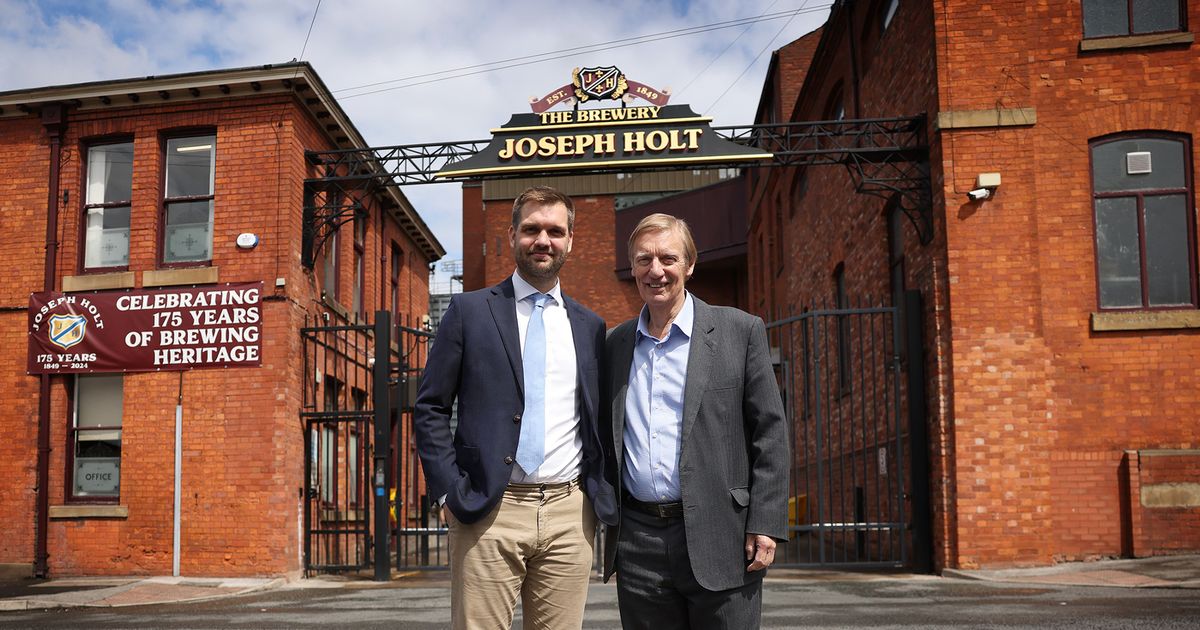It’s responsible for producing the equivalent of 15 million pints a year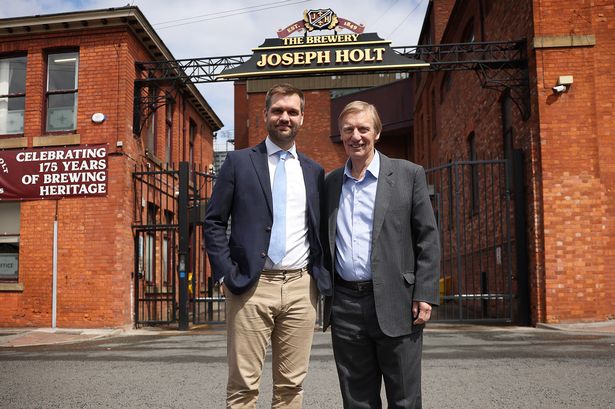 Joseph Holt remains a family-run business – with Richard Kershaw (right) overseeing the company, alongside his son Andrew (left)(Image: Manchester Evening News)
Joseph Holt remains a family-run business – with Richard Kershaw (right) overseeing the company, alongside his son Andrew (left)(Image: Manchester Evening News)
Joseph Holt is a Manchester institution – it’s a name we see on the doors of many establishments and on many pints of beer. The name is also situated at the top of a high-rise metal gate in the middle of Cheetham Hill as it pinpoints its historic brewery base.
Founded in 1849, the beer giant started as a small brewery behind a pub on Oak Street before moving to its long-standing premises in North Manchester in 1860. It now produces 15 million pints a year and is still run by the Holt family today.
The extraordinary history of Joseph Holt, who died in 1886, featured everything from spending two years as the Lord Mayor of Manchester, and receiving a knighthood for bringing a fresh water supply into the city.
Leading operations of the business today is Richard Kershaw, the great-great grandson of Joseph, and is joined by his son and daughter Andrew and Jane (sixth generation Holt’s) in the day-to-day running of the empire.
Stay connected with our City Life newsletter here
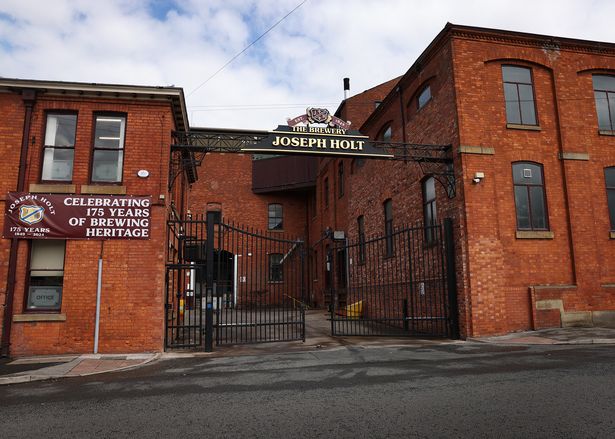 The Joseph Holt brewery, in Cheetham Hill, has played a vital role in the business since 1860(Image: Manchester Evening News)
The Joseph Holt brewery, in Cheetham Hill, has played a vital role in the business since 1860(Image: Manchester Evening News)
Richard himself took on the leadership of the business in 2000 from his dad Peter as the company was taken back into private ownership after almost 50 years. It’s now behind popular drinks like Spin Doctor, Crystal, and Trailblazer, and helps landlords run venues like Ape and Apple in the city centre and the Lower Turks Head in the Northern Quarter.
It is also behind the Woodthorpe Hotel on Bury New Road in Prestwich, which dates back to 1851 and became the unofficial home for Oasis fans during the Heaton Park gigs earlier this year.
“It all started with one pub in the centre of Manchester,” Richard, who first joined the business in 1980, tells the Manchester Evening News of the business’ foundations “And then it all just gradually cranked up from there. We now have 127 pubs across the North West.”
With the pub side of the business, the company owns the venues themselves as managed houses but the landlords, a mix of self-employed or company staff, will focus on running things.
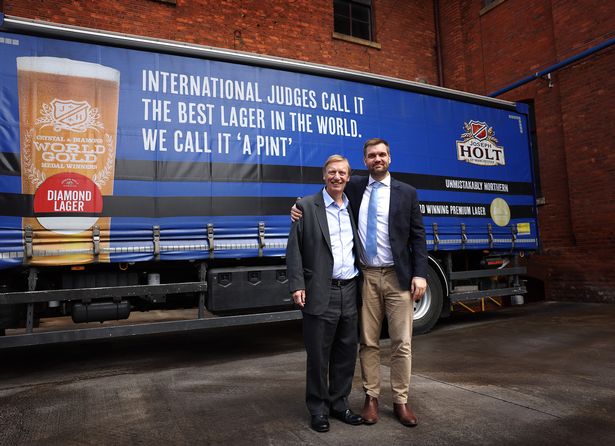 Joseph Holt have won seven gold medals at the last seven International Brewing Awards, which is more than any other brewer(Image: Manchester Evening News)
Joseph Holt have won seven gold medals at the last seven International Brewing Awards, which is more than any other brewer(Image: Manchester Evening News)
“Our pubs are very traditional, and we make no apologies for that,” Richard explains. “We feel there is a real need and a place for a proper community pub, and the target for every single pub is to be the best community pub in the area. That’s their number one target.”
But whilst still remaining traditional, it’s safe to say the use of a pub – and those who use the establishments – has changed over the years. “Back in the day, our business was quite a bloke-heavy industry revolving around drink, but we now hear that our pubs are home to things like mum and baby groups and yoga sessions,” Andrew explains.
“We love that our pubs can be this home, this community for people of different demographics and ages. We have Menopause Monday, which started as a group session at the Ye Golden Lion in Blackley, and it’s just become such a big thing for the community.”
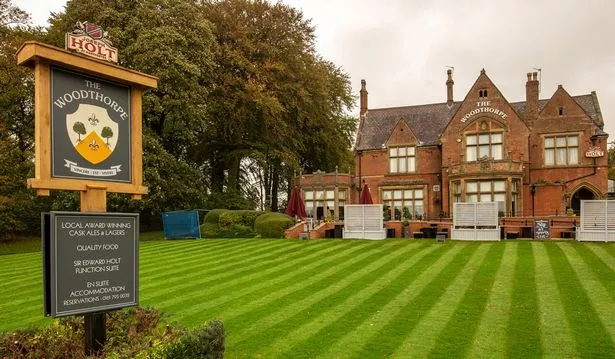 Joseph Holt pub The Woodthorpe regularly hosts its own beer festival, and also led a popular series of events for Oasis fans during the nearby Heaton Park concerts(Image: Joseph Holt)
Joseph Holt pub The Woodthorpe regularly hosts its own beer festival, and also led a popular series of events for Oasis fans during the nearby Heaton Park concerts(Image: Joseph Holt)
Last year, to coincide with the company’s 175th anniversary, Joseph Holt’s pubs raised money for The Christie – raising over £710,000 collectively. “We operate pubs in some pretty challenging areas that have faced some real struggles in the last few years,” Andrew explains.
“So, to raise that amount of money just shows the generosity of the great folk in the North West. It also shows how our pubs are the epicentre of getting people together behind a common cause.”
In fact, Christie’s roots are connected to the man behind it all too. Formerly known as the Christie Hospital and Holt Radio Institute, Joseph donated £20,000 worth of radium to the hospital back in 1914 – around £2m today – to help treat cancer.
‘You can brew more beer in a day than you would ever be able to drink in a lifetime’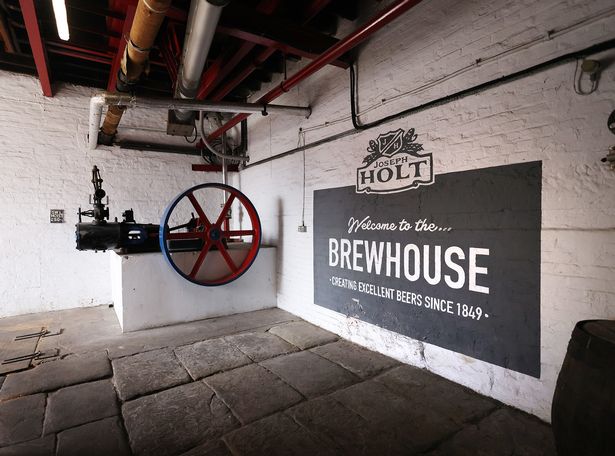 The Joseph Holt brewery, in Cheetham Hill, produces 15 million pints a year(Image: Manchester Evening News)
The Joseph Holt brewery, in Cheetham Hill, produces 15 million pints a year(Image: Manchester Evening News)
Across the way from the Joseph Holt offices, which used to be his house, is the brewery where the magic all happens when it comes to beer and ale. The very technical process – including malting, milling, mashing, lautering, boiling, fermentation, conditioning, and packaging – is all done here.
Its scientific-backed approach has been tried and tested over years to ensure each process and condition is just right for that perfect pint. And it’s still something that is constantly evolving, with climate change affecting the crops of husks and malt as one example, whilst the likes of changing temperatures, and even gravity all impacting on the taste and end product.
“It’s quite fun to play around with different methods,” head brewer Phil Parkinson explains during a tour of the site. “We’re choosing what is intentionally included in each brew, there are brewers in Belgium that will do things very different to us and that will be tasted in the end product.
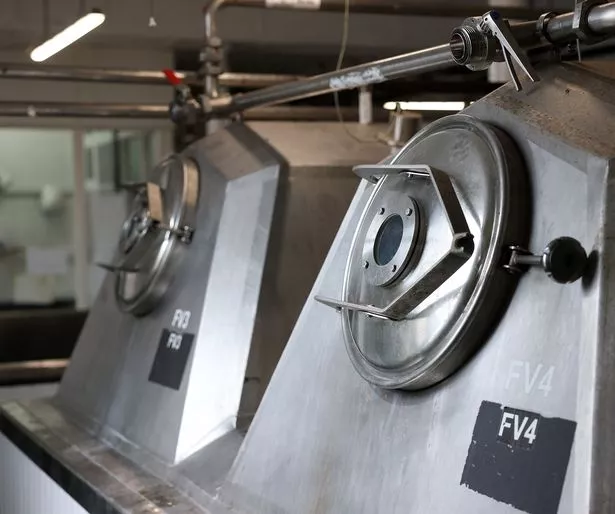 Fermentation vessels allow yeast to convert sugar into alcohol and carbon dioxide, before continuing on the next step of the journey(Image: Manchester Evening News)
Fermentation vessels allow yeast to convert sugar into alcohol and carbon dioxide, before continuing on the next step of the journey(Image: Manchester Evening News)
“That’s what’s so great about this industry, there is space for all of these different products. There are so many ways to go about it.”
Based around a 175-year-old strain of yeast, which is cultivated into new batches every few months, Joseph Holt’s beer-making process still ‘remains faithful’ to its original brewing traditions – despite having kept up to date with new technology advancements and upgrades, like swapping copper for stainless steel and switching from wooden barrels to metal kegs.
The process includes three mash tuns, which vary in size, and three coppers, which can ultimately brew up to around 500 barrels a day which are then sent out to pubs and bars across the country. Using top quality malt and hops from the UK, like Admiral Whitbread, the beers and ales are fermented, chilled and cold-conditioned in a well-established process that takes 21 days before they are packaged.
“We still store our lagers for 21 days to get that nice flavour and fullness,” Richard explains. “Other breweries are choosing to cut down on this storage time, with some only now taking a day, but, for us, it’s all about making the best beer we possibly can.”
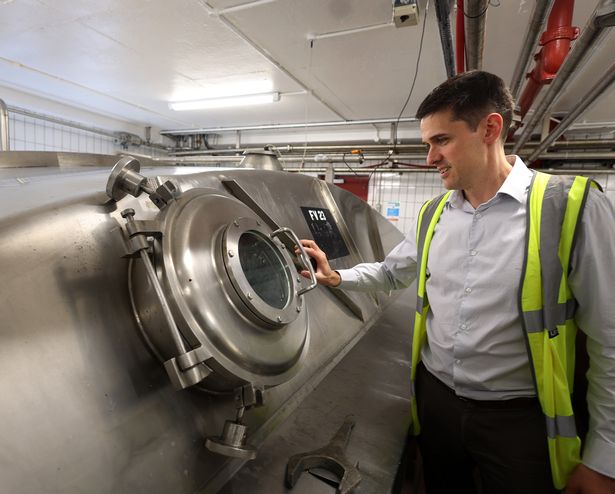 Head brewer Phil Parkinson said it’s ‘quite fun’ perfecting the process behind each brew(Image: Manchester Evening News)
Head brewer Phil Parkinson said it’s ‘quite fun’ perfecting the process behind each brew(Image: Manchester Evening News)
The brewery also has its own well and water system, which is used throughout the beer making process, including as ‘hot liquor’, which is used in mashing and sparging grains at the right temperature.
“There’s not much in a brewery that can’t be reused,” brewer Phil explains. “The beer industry has actually always been pretty sustainable. The husk will get sent away as cattle food, and the hot liquor is used again to heat things up further down in the process.”
But whilst the complicated and incredibly technical process has been refined over the years, it all revolves around making the perfect beer – and the equivalent of over 300,000 pints are produced at the Manchester brewery each day.
“It’s amazing to think that you can brew more beer in a day than you would ever be able to drink in a lifetime,” Phil laughs. “But everything comes back to drinkability. You want to produce something which people choose as their first, second and third pint, and that’s an incredible challenge.
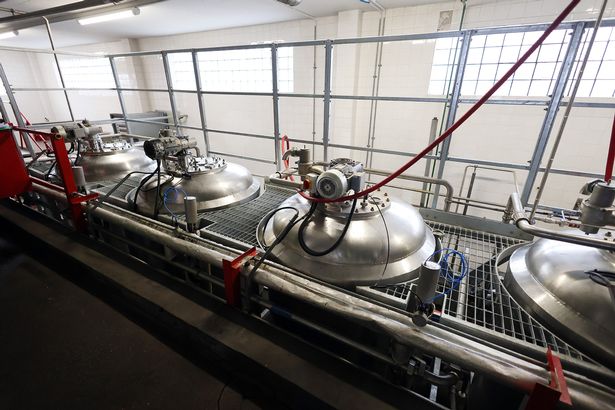 Every aspect of the beer-making process has been refined to a tee – with no room for error(Image: Manchester Evening News)
Every aspect of the beer-making process has been refined to a tee – with no room for error(Image: Manchester Evening News)
“It’s the quality of beer that matters the most. You want to be able to produce better beer than everybody else. If you don’t have a good pint, then people will go elsewhere – there are plenty of other options out there.”
The brewery has always been at the heart of the business – as it was always set to out to be – and whilst that has never changed, some other aspects have. “The business is completely different to what it was when I started 45 years ago,” Richard muses.
“In the 80s, we didn’t sell a single chip. Now we’ve got 13 food pubs that do a really good offering. It is a very different market now, it’s a lot more diverse, which is great. We offer 20 different beers now – it was just mild and bitter when I started. You were lucky if there was anything else, that was the lot.”
Join our Manc Life WhatsApp group HERE
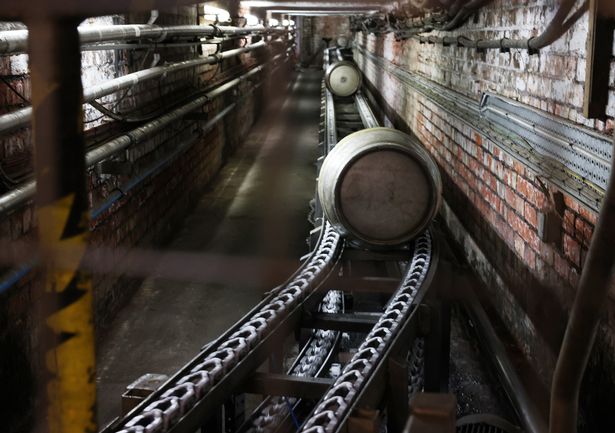 Around 500 barrels of beer make their way through the brewery each day(Image: Manchester Evening News)‘We get to help people spend their ‘fun’ money’
Around 500 barrels of beer make their way through the brewery each day(Image: Manchester Evening News)‘We get to help people spend their ‘fun’ money’
Another game-changing product of Joseph Holt’s is their Trailblazer. It was created as an alternative to Guinness and has, perhaps surprisingly to some, managed to become more successful in some venues than the original Irish stout.
“When we normally produce a new beer, it takes us a while to tweak and refine it but we actually managed to get Trailblazer right on the first go,” Richard explains. “Every year, sales go up and up.”
“It was a very bold move for us,” Andrew adds. “We could have lost out on a lot of business as a result, but actually, in my opinion of course, I think we have the better product. Guinness is an incredibly expensive product and it was getting tough to offer it for a good value to our customers, so we thought we could try and sell our own.
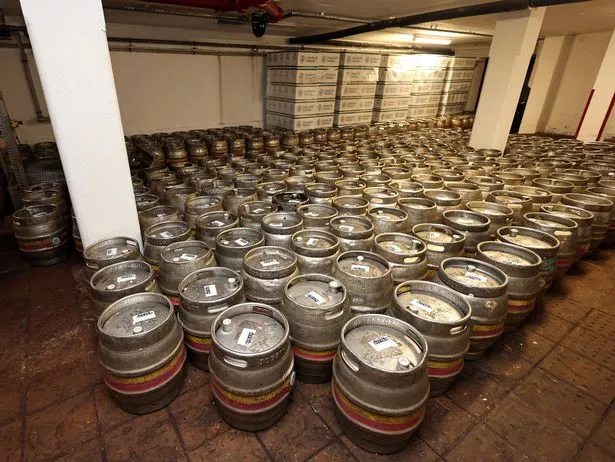 The end result is then sent off to pubs, bars, restaurants, and venues across the country(Image: Manchester Evening News)
The end result is then sent off to pubs, bars, restaurants, and venues across the country(Image: Manchester Evening News)
“We backed ourselves, and we now sell more of Trailblazer than we ever did for Guinness – which is an incredible feat.”
Of course, the pub industry is having its own set of struggles right now. Increases on VAT and business rates are seeing owners struggle to make ends meet, with rising costs being faced by the customer. A recent study by the British Beer and Pub Association found that nearly 300 pubs closed across England and Wales last year – working out at around six pubs a week.
“There isn’t a business that hasn’t been impacted by everything that’s happened in the last five years,” Andrew says. “We’ve not been immune to any of those things – it’s been a really challenging few years – but we’re a strong and stable business.
“We’ve got through two world wars, we got through the almost-prohibition of the 1930s, and we’ll get through this. Our history has always been about adapting and evolving with the times. The pub industry has never been about standing still.”
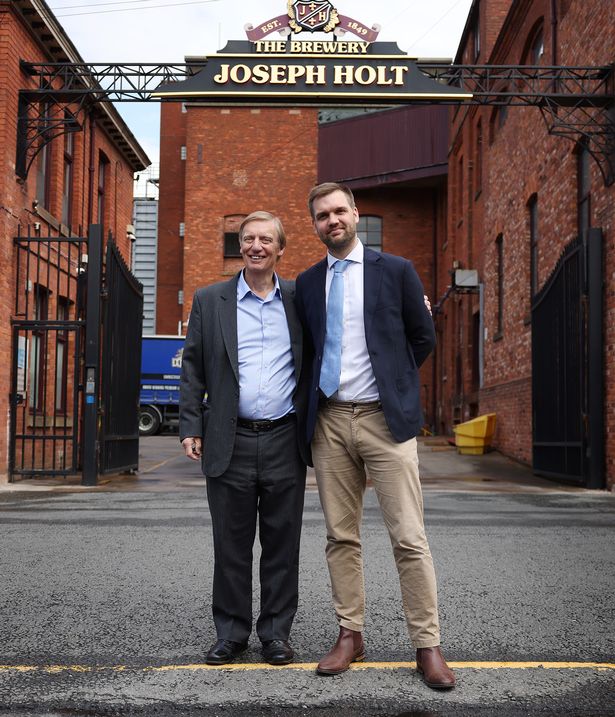 The family behind Joseph Holt say they have continued to be a leader in the industry through adapting, innovating and having a great beer(Image: Manchester Evening News)
The family behind Joseph Holt say they have continued to be a leader in the industry through adapting, innovating and having a great beer(Image: Manchester Evening News)
Both Richard and Andrew say that real success of Joseph Holt, besides its great tasting drinks, is the people in the company – whether it’s landladies, brewers, sellers, or the customers. Throughout the company, including its pubs, there are around 11,500 staff members associated with Joseph Holt.
“We’ve got some great people and that’s what makes our business,” Andrew says. “You can have the most amazing beers in the world and the most amazing pubs in great locations, but if you don’t have a nice experience with a member of staff then it’s all for nothing.”
And going forward, it’s innovation, it’s great people and it’s great beer will be what continues to set Joseph Holt apart from others.
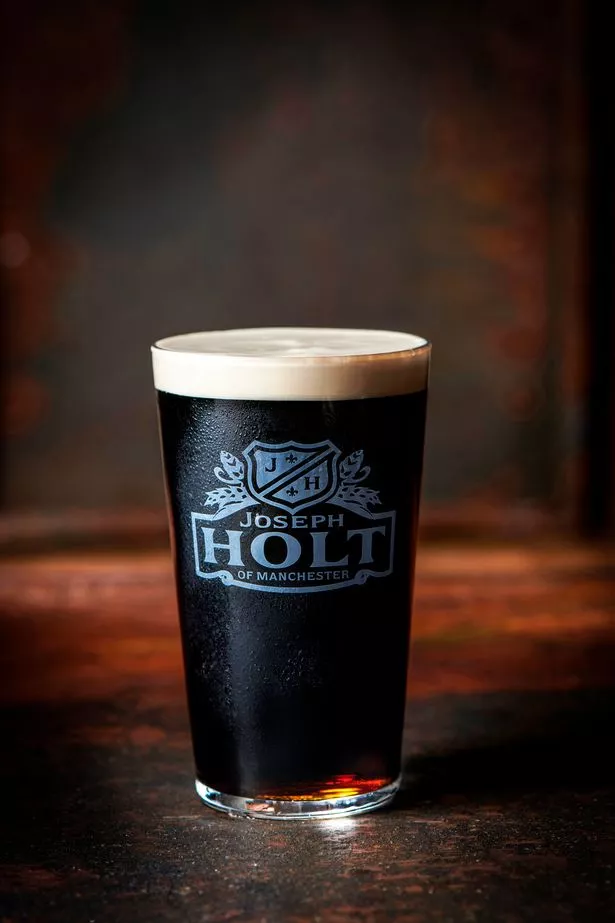 Joseph Holt’s Trailblazer stout has proved to be more popular than Guinness in some pubs
Joseph Holt’s Trailblazer stout has proved to be more popular than Guinness in some pubs
“As a family company, we can make long-term decisions and not be held to shareholders for short-term profits,” Richard explains. “We had 80 pubs when I first joined in 1980. My objective when I started was to double that, but we’ve not done bad with 127.
“We’ve just worked out a fantastic formula for making terrific beers which means we can just continue to focus on quality – and that is something that will just continue.”
Andrew adds: “I feel so proud that we get to help people spend their ‘fun’ money. We’ve all got to spend money on things like bills and other costs, but we are there for the spare money left at the end of the week for a drink out or a nice meal with the family. I’m really proud that we can facilitate that.”
